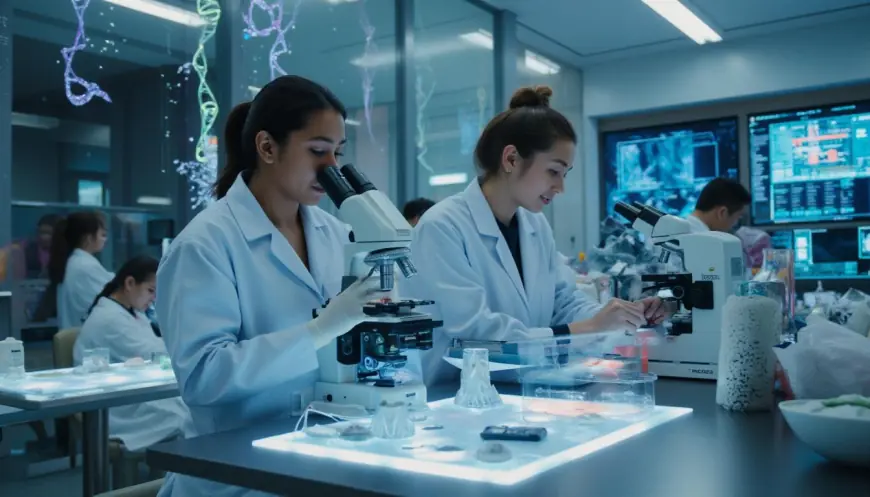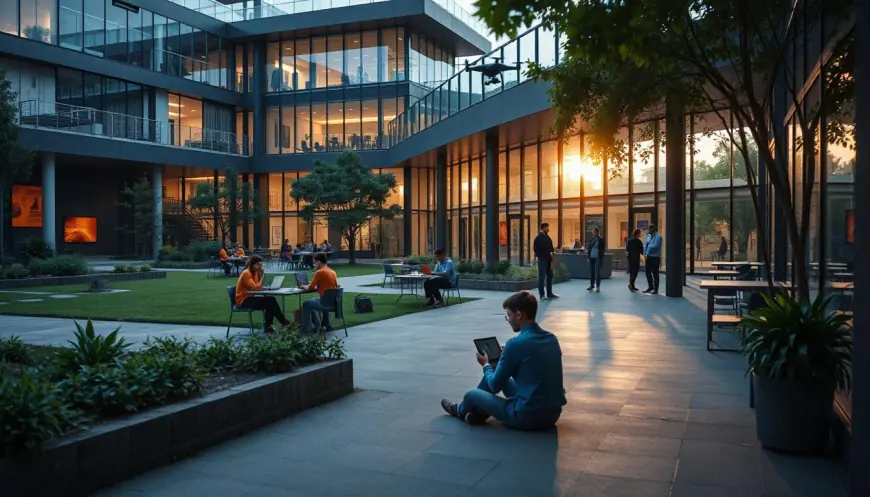How Biotechnology Engineering Programs Aid Health & Eco
Explore how Biotechnology engineering programs drive healthcare innovations & sustainability. Learn more with MCSGOC’s advanced biotech education.
In an era where the world is grappling with environmental degradation and the need for advanced healthcare solutions, Biotechnology engineering programs are emerging as game-changers. These programs are not just academic pursuits but a crucial foundation for real-world impact—especially in the domains of public health, pharmaceuticals, agriculture, and environmental sustainability.
At institutions like MCSGOC (Dr. M.C. Saxena Group of Colleges), biotechnology is more than a subject—it’s a commitment to the future. This comprehensive guide explores how biotechnology engineering programs contribute to two vital sectors: healthcare and sustainability, and why students with a passion for science and innovation should consider this dynamic career path.
Introduction: Understanding Biotechnology Engineering
Biotechnology Engineering is a multidisciplinary field that combines biology, chemistry, physics, mathematics, and engineering principles to create products and technologies that improve human life and protect the environment.
Students enrolled in biotechnology engineering programs are trained to manipulate biological systems or organisms to develop new technologies in areas such as:
-
Healthcare and medicine
-
Food production
-
Environmental conservation
-
Genetic engineering
-
Industrial processing
As these technologies evolve, their application becomes more crucial in addressing global challenges.
Biotechnology in Healthcare: A Medical Revolution
1. Development of Vaccines and Drugs
Biotechnology Engineering Programs have been instrumental in producing vaccines and pharmaceuticals. During the COVID-19 pandemic, biotech-enabled mRNA vaccines from Pfizer and Moderna demonstrated the importance of biotech in combating global crises.
Graduates from MCSGOC’s biotechnology engineering program often find careers in research labs and pharmaceutical companies, contributing to life-saving innovations.
2. Genetic Engineering & Gene Therapy
With the rise of CRISPR and other gene-editing tools, biotech is making it possible to correct genetic defects, potentially curing inherited diseases.
Biotechnology engineers are at the forefront of:
-
Designing gene therapy solutions
-
Diagnosing genetic disorders early
-
Developing personalized treatments
3. Stem Cell Therapy and Regenerative Medicine
Biotechnology is the backbone of regenerative medicine, which helps repair or replace damaged tissues and organs. Through biotech processes:
-
Stem cells can be cultivated in labs
-
Tissues can be 3D printed
-
Damaged organs may be regenerated
4. Diagnostic Technologies
Biotech engineers play a key role in developing advanced diagnostic tools:
-
PCR tests
-
ELISA kits
-
DNA sequencing devices
These are essential in detecting diseases at an early stage, enhancing survival rates and patient care.
Biotechnology & Sustainability: Engineering a Greener Planet
1. Biofuels and Renewable Energy
Converting biomass into biofuels is a significant leap toward sustainable energy. Biotech engineers are innovating ways to produce ethanol, biodiesel, and biogas from:
-
Agricultural waste
-
Algae
-
Microorganisms
This reduces dependency on fossil fuels and minimizes greenhouse gas emissions.
2. Waste Management & Bioremediation
Biotechnology engineering programs teach students how to use microorganisms to treat waste. Through processes like bioremediation, pollutants such as:
-
Oil spills
-
Industrial waste
-
Heavy metals
can be neutralized and removed from the environment.
3. Agricultural Biotechnology
Modern farming is being revolutionized with genetically modified crops that:
-
Resist pests and diseases
-
Require less water and fertilizers
-
Yield higher productivity
This not only improves food security but also ensures environmentally responsible farming.
4. Eco-Friendly Industrial Solutions
From biodegradable plastics to enzyme-based detergents, biotech is reducing our environmental footprint. Industries are now replacing chemical-intensive processes with bio-based alternatives, thanks to research in biotech engineering.
MCSGOC’s Contribution to Biotech Excellence
The Dr. M.C. Saxena Group of Colleges (MCSGOC) stands out as a leading institution offering biotechnology engineering programs in India. Here’s how MCSGOC fosters academic and industry success:
1. Advanced Curriculum
Designed in collaboration with industry experts, the curriculum includes:
-
Molecular biology
-
Genetic engineering
-
Bioinformatics
-
Bioprocess technology
-
Environmental biotechnology
2. Industry Exposure
MCSGOC ensures students gain real-world experience through:
-
Industrial visits
-
Live projects
-
Internships at biotech firms
3. Modern Laboratories
Equipped with cutting-edge instruments for:
-
DNA extraction and sequencing
-
Cell culture
-
Bioprocessing
4. Research & Innovation Hub
MCSGOC encourages students to participate in national and international research projects, pushing boundaries in:
-
Vaccine development
-
Wastewater treatment
-
Agricultural biotech
Career Opportunities After Biotechnology Engineering Programs
Biotechnology graduates can pursue lucrative and meaningful careers in various sectors, including:
| Sector | Job Roles |
|---|---|
| Healthcare | Clinical Research Associate, Biotech Analyst |
| Pharmaceuticals | Drug Developer, Quality Control Officer |
| Agriculture | Genetic Engineer, Agribiotech Expert |
| Environment | Waste Management Specialist, Bioremediation Expert |
| Education & Research | Research Scientist, Academic Faculty |
Global Impact of Biotechnology
Biotech isn’t just helping individuals—it’s helping the planet. Some major global milestones include:
-
The Human Genome Project
-
Development of Bt cotton in India
-
Creation of golden rice
-
mRNA vaccine revolution
-
Biodegradable plastics from corn starch
All these achievements highlight how crucial biotechnology engineering is for sustainable development.
Why Choose MCSGOC for Biotechnology Engineering?
MCSGOC believes in nurturing future-ready biotech professionals who are equipped not just with knowledge, but with the tools to bring real-world change.
Unique Features:
-
Experienced faculty
-
Placement assistance
-
Collaborations with biotech companies
-
Affordable fee structure
-
Hostel and scholarship facilities
Choosing MCSGOC for your biotechnology engineering program means investing in a future where you contribute to both health and environmental progress.
15 Frequently Asked Questions (FAQs)
1. What is biotechnology engineering?
Biotechnology engineering is a branch of science that combines biology and technology to develop products for healthcare, agriculture, and environment.
2. How do biotechnology engineering programs help healthcare?
They contribute to drug development, vaccines, diagnostics, gene therapy, and regenerative medicine.
3. What is the role of biotechnology in sustainability?
Biotech helps in waste treatment, biofuel production, green manufacturing, and sustainable agriculture.
4. Is biotechnology a good career in India?
Yes, it offers diverse opportunities in pharma, agriculture, healthcare, research, and more.
5. What subjects are taught in a biotechnology engineering program?
Subjects include molecular biology, biochemistry, genetics, immunology, and bioinformatics.
6. What industries hire biotech engineers?
Pharmaceuticals, agriculture, healthcare, energy, environment, and food industries.
7. Can I pursue higher studies after a biotechnology degree?
Yes, options include M.Tech, MS, Ph.D., or MBA in biotech management.
8. How is MCSGOC different from other colleges?
MCSGOC offers industry-driven curriculum, experienced faculty, advanced labs, and strong placements.
9. What are the eligibility criteria for biotechnology engineering at MCSGOC?
Candidates should have completed 10+2 with Physics, Chemistry, and Biology/Mathematics.
10. What is the duration of the biotechnology engineering program?
It is a 4-year undergraduate degree (B.Tech).
11. Are internships part of the curriculum at MCSGOC?
Yes, students undergo mandatory internships to gain industry exposure.
12. What kind of research can students do in biotech?
Research areas include genetic engineering, microbiology, drug formulation, and environmental biotech.
13. Does MCSGOC help in placements?
Yes, the college has strong ties with biotech firms for placements.
14. Are scholarships available at MCSGOC?
Yes, scholarships are offered based on merit and financial background.
15. How can I apply for the biotechnology program at MCSGOC?
You can apply online through the official MCSGOC website or visit the campus for direct admission.
Conclusion: A Future Shaped by Biotech
Biotechnology is shaping a future that is healthier, safer, and more sustainable. The fusion of science and technology has already transformed lives and continues to promise exciting innovations ahead.
With institutions like MCSGOC offering top-tier biotechnology engineering programs, students are equipped not only with theoretical knowledge but also with practical exposure to build solutions that truly matter.
If you’re looking to build a career at the intersection of science, technology, and impact, this is your moment to step into the world of biotechnology—and change the world.
What's Your Reaction?
 Like
0
Like
0
 Dislike
0
Dislike
0
 Love
0
Love
0
 Funny
0
Funny
0
 Angry
0
Angry
0
 Sad
0
Sad
0
 Wow
0
Wow
0


















































